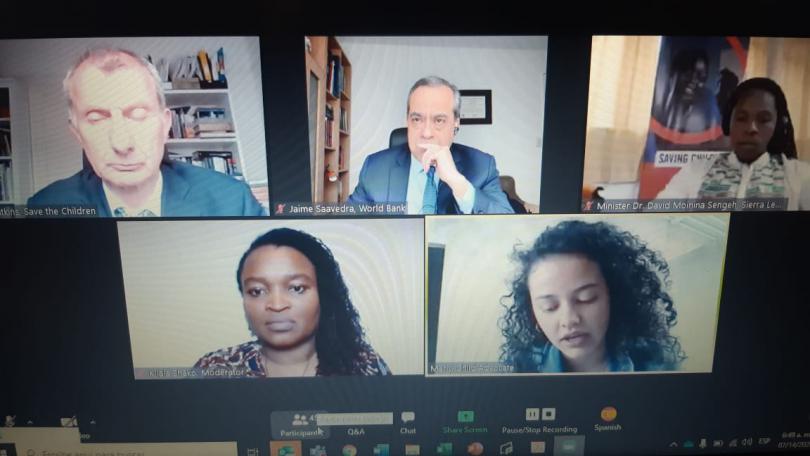CHILDREN ARE THE PRESENT AND THE FUTURE
The rapid spread of coronavirus has forced the world's schools to shut their doors to over 1.6 billion learners. Nearly 10 million children may never return. In response to coronavirus and its devastating impact on children, we are campaigning with children to remove barriers to learning and Save Our Education.
In Colombia, the impact of COVID-19 on education has deepened the gaps between rural and urban areas. About 21.7 million people have internet access, compared to 23.8 million in the most remote areas who do not.
Child advocate, Marly, is 16 years old and is from Norte de Santander in Colombia, where she participates in the Save the Children project "Catatumbo loves education". We invited her to be a guest speaker at the global launch of our Save our Education report.
In Marly’s words
"The online event was part of the High-Level Political Forum on Development Goals at the United Nations. There were over 480 people from all over the world connected. I will always remember the feeling of knowing that many important people were listening to me, such as the Minister of Education of Colombia and others, and that they were also paying attention to the important things I was going to say.
I spoke for the children and youth of Colombia about access and quality of education during the COVID-19 crisis – a problem that not only affects me, but all children in my country and even the world.
I shared about how thousands of children and young people have been forced to adopt a new system of learning by virtual means that has generated many difficulties. We are aware of the efforts made by organisations and the Government to prevent us from dropping out of school, but there are still many things to be done.
It is tiring for a child to have to stay in front of an electronic device all day to play the role of a student, and it could have long-term consequences. In addition, there are children without internet or who live far away and do not have access to the guidelines.
I gave the example of the rural areas of Colombia, especially the place where I live, Catatumbo. It is a region that has suffered through a war between groups outside the law and the Government for more than 50 years. The war mostly affects children and young people, who have nothing to do with the conflict. In addition, there is no internet, there is no telephone signal, and there are many low-income families.
The Ministry of Education has chosen to provide physical printed copies of guidelines for all these children, but access for families to obtain these activities is very difficult. The distance from the rural areas to the urban areas is quite far, and a large proportion of parents do not know how to read. So imagine how education for these children becomes very difficult. Many of them leave school. At this time of coronavirus, many students have decided to drop out.

In order to change this situation we need first of all an adequate and satisfactory preparation for teachers on ICT (information and communication technology), economic improvements for children in rural areas (called Veredales in Colombia), and economic benefits that poorer students could use for books, learning guidelines, internet access, or as a way in to higher education, for example. All this to achieve the quality education that we so much hope to have.
For Colombia, I asked that the State direct its attention to children and not leave us out. Children and young people are the present and the future of the world. With our education, there is potential for the change that we have wanted to achieve for centuries, but States have not wanted to make that a reality. The voices of children must be heard, since that will benefit both the State and children themselves.
I recognise that it is difficult, but it is a collective work that will generate collective gains. Let's stop thinking about our own good, let's fight a little more for everyone, just a little. Let's show that we Colombians fight for our rights. The governors of our country know that more than anyone else.
On the same day as I took part in the event, I shared my experience with my family and friends. Everyone congratulated me or said "Wow, really?”. The principal of my school and the psychologist called me; she let the school know what I had done, what I said. Of course, at school I will talk about my experience on a virtual call.
I think that I said what had to be said. Knowing that the Minister of Education of Colombia listened to me makes me think that the government can make good decisions. Because how do you solve something if you do not know about it?
Now I want to focus on my studies and finish high school. I want to be able to study political science and, in the future, I want to be president of Colombia. I have always liked politics, and to participate. I hope that my words will serve to improve education in Colombia today."
Marly participates in the “Catatumbo loves Education” project, which is focused on access to safe and quality education. The project seeks to benefit more than 15,994 children and adolescents in this northwestern region of Colombia that has been highly affected by the armed conflict, poverty, migration and lack of access to basic services
All over the world, Save the Children is rapidly adapting existing work whilst preparing for outbreaks of coronavirus in countries with limited capacity to respond. We've also launched the #SaveOurEducation campaign to tackle the global education emergency.




